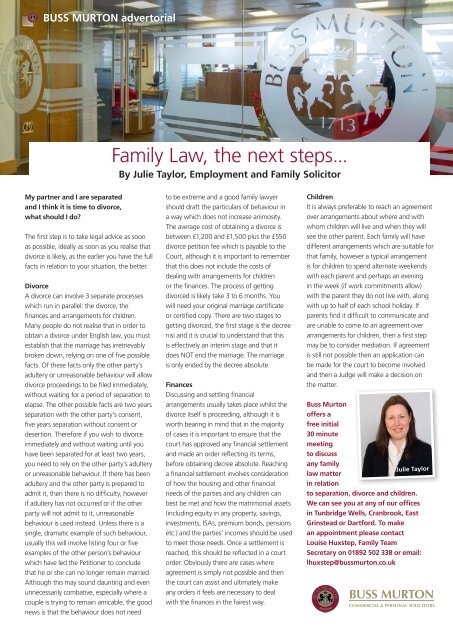Wealden Times | WT171 | May 2016 | Restoration & New Build supplement inside
Wealden Times - The lifestyle magazine for the Weald
Wealden Times - The lifestyle magazine for the Weald
You also want an ePaper? Increase the reach of your titles
YUMPU automatically turns print PDFs into web optimized ePapers that Google loves.
BUSS MURTON advertorial<br />
Family Law, the next steps...<br />
By Julie Taylor, Employment and Family Solicitor<br />
My partner and I are separated<br />
and I think it is time to divorce,<br />
what should I do?<br />
The first step is to take legal advice as soon<br />
as possible, ideally as soon as you realise that<br />
divorce is likely, as the earlier you have the full<br />
facts in relation to your situation, the better.<br />
Divorce<br />
A divorce can involve 3 separate processes<br />
which run in parallel: the divorce, the<br />
finances and arrangements for children.<br />
Many people do not realise that in order to<br />
obtain a divorce under English law, you must<br />
establish that the marriage has irretrievably<br />
broken down, relying on one of five possible<br />
facts. Of these facts only the other party’s<br />
adultery or unreasonable behaviour will allow<br />
divorce proceedings to be filed immediately,<br />
without waiting for a period of separation to<br />
elapse. The other possible facts are two years<br />
separation with the other party’s consent,<br />
five years separation without consent or<br />
desertion. Therefore if you wish to divorce<br />
immediately and without waiting until you<br />
have been separated for at least two years,<br />
you need to rely on the other party’s adultery<br />
or unreasonable behaviour. If there has been<br />
adultery and the other party is prepared to<br />
admit it, then there is no difficulty, however<br />
if adultery has not occurred or if the other<br />
party will not admit to it, unreasonable<br />
behaviour is used instead. Unless there is a<br />
single, dramatic example of such behaviour,<br />
usually this will involve listing four or five<br />
examples of the other person’s behaviour<br />
which have led the Petitioner to conclude<br />
that he or she can no longer remain married.<br />
Although this may sound daunting and even<br />
unnecessarily combative, especially where a<br />
couple is trying to remain amicable, the good<br />
news is that the behaviour does not need<br />
to be extreme and a good family lawyer<br />
should draft the particulars of behaviour in<br />
a way which does not increase animosity.<br />
The average cost of obtaining a divorce is<br />
between 1,200 and 1,500 plus the 550<br />
divorce petition fee which is payable to the<br />
Court, although it is important to remember<br />
that this does not include the costs of<br />
dealing with arrangements for children<br />
or the finances. The process of getting<br />
divorced is likely take 3 to 6 months. You<br />
will need your original marriage certificate<br />
or certified copy. There are two stages to<br />
getting divorced, the first stage is the decree<br />
nisi and it is crucial to understand that this<br />
is effectively an interim stage and that it<br />
does NOT end the marriage. The marriage<br />
is only ended by the decree absolute.<br />
Finances<br />
Discussing and settling financial<br />
arrangements usually takes place whilst the<br />
divorce itself is proceeding, although it is<br />
worth bearing in mind that in the majority<br />
of cases it is important to ensure that the<br />
court has approved any financial settlement<br />
and made an order reflecting its terms,<br />
before obtaining decree absolute. Reaching<br />
a financial settlement involves consideration<br />
of how the housing and other financial<br />
needs of the parties and any children can<br />
best be met and how the matrimonial assets<br />
(including equity in any property, savings,<br />
investments, ISAs, premium bonds, pensions<br />
etc.) and the parties’ incomes should be used<br />
to meet those needs. Once a settlement is<br />
reached, this should be reflected in a court<br />
order. Obviously there are cases where<br />
agreement is simply not possible and then<br />
the court can assist and ultimately make<br />
any orders it feels are necessary to deal<br />
with the finances in the fairest way.<br />
Children<br />
It is always preferable to reach an agreement<br />
over arrangements about where and with<br />
whom children will live and when they will<br />
see the other parent. Each family will have<br />
different arrangements which are suitable for<br />
that family, however a typical arrangement<br />
is for children to spend alternate weekends<br />
with each parent and perhaps an evening<br />
in the week (if work commitments allow)<br />
with the parent they do not live with, along<br />
with up to half of each school holiday. If<br />
parents find it difficult to communicate and<br />
are unable to come to an agreement over<br />
arrangements for children, then a first step<br />
may be to consider mediation. If agreement<br />
is still not possible then an application can<br />
be made for the court to become involved<br />
and then a Judge will make a decision on<br />
the matter.<br />
Buss Murton<br />
offers a<br />
free initial<br />
30 minute<br />
meeting<br />
to discuss<br />
any family<br />
law matter<br />
in relation<br />
to separation, divorce and children.<br />
We can see you at any of our offices<br />
in Tunbridge Wells, Cranbrook, East<br />
Grinstead or Dartford. To make<br />
an appointment please contact<br />
Louise Huxstep, Family Team<br />
Secretary on 01892 502 338 or email:<br />
lhuxstep @bussmurton.co.uk<br />
Julie Taylor<br />
BUSS MURTON<br />
COMMERCIAL & PERSONAL SOLICITORS


















